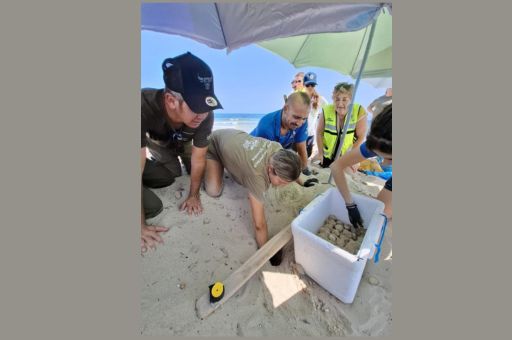Clutch found on Es Cavallet beach with a total of 85 eggs
The Ministry of Agriculture, Fisheries, and Natural Environment has confirmed the first sea turtle (Caretta caretta) nest of the season in Ibiza. This is the second confirmed nest in the Balearic Islands this year, following the one found in July on Can Pere Antoni beach in Palma. The newly discovered clutch was located on Es Cavallet beach, within the Ses Salines Natural Park of Ibiza, and contains 85 eggs.
TDB keeps you informed. Follow us on: Facebook, Twitter and Instagram
Balearic Government Reports First Sea Turtle Nest of the Season in Ibiza
The discovery occurred on Thursday morning when a passerby spotted a large sea turtle preparing its nest at the upper part of the beach, near the dunes. The witness alerted the 112 emergency number, which passed the information to the Balearic Wildlife Recovery Consortium (COFIB) for handling.
COFIB staff arrived at the site and confirmed turtle tracks, which led to the definitive identification of the 85 eggs buried in the sand.
Given the date of laying — and considering that sea turtle eggs take between 55 and 60 days to incubate naturally — the eggs will be transferred to Mallorca for artificial incubation to ensure their viability and increase hatching success.
The operation was coordinated by COFIB, under the Directorate General for Natural Environment and Forest Management of the Ministry of Agriculture, Fisheries and Natural Environment, with the collaboration of the Sant Josep de sa Talaia Town Council, the Ses Salines Natural Park of Ibiza and Formentera, MarSave lifeguard staff, and the beach’s concessionaire company, IBIFOR.
Anna Torres, Director General for Natural Environment and Forest Management, explained that “climate change may be one of the reasons for the change in the reproductive behaviour of sea turtles, which are now nesting in the western Mediterranean. Therefore, we will have to get used to seeing nesting events along the archipelago’s coasts.” Torres also called on the public to cooperate by contacting the 112 emergency number if they see a sea turtle nesting, turtle tracks in the sand, or hatchlings emerging on the beach.
The loggerhead sea turtle (Caretta caretta) is classified as a vulnerable species. Its nesting on the Spanish Mediterranean coast is becoming increasingly common, with nests recorded every year since 2014.
